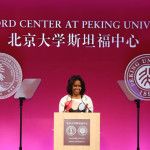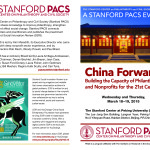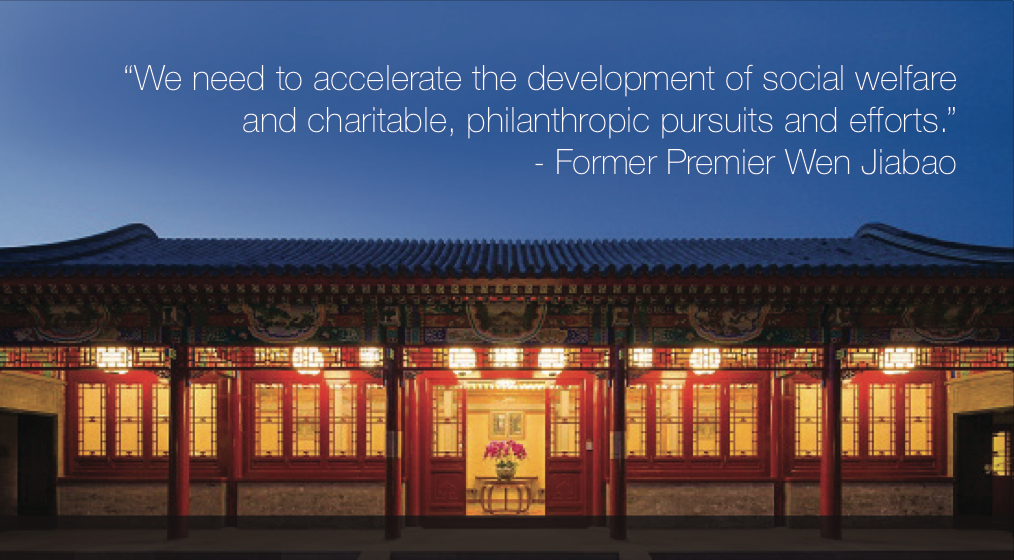Stanford PACS in China – old
Stanford PACS’ China program explores and shares ideas that create social change, aiming to expand academic research on philanthropy in China; increase the pipeline of scholars, practitioners, and leaders for the Chinese social sector; advance the practice of philanthropy and social innovation in China.
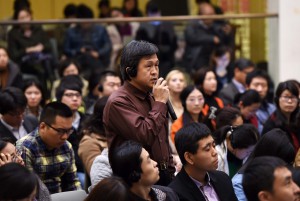
An audience member at the 2015 Stanford PACS conference in Beijing, “21st Century Perspectives on Philanthropy and Civil Society.”
Stanford PACS is one of the inaugural anchor programs at the Stanford Center at Peking University, taking our work on philanthropy and civil society global.
Like the home office on the Stanford campus in Palo Alto, Stanford PACS-PKU serves Stanford faculty, visiting scholars, postdoctoral fellows, graduate and undergraduate students, and nonprofit and foundation practitioners visiting of conducting research in China. In addition to an annual conference held at PKU each spring, Stanford PACS also conducts China-focused research, provides opportunities for undergraduate and graduate students to engage in cross-cultural exchange, and licenses a Chinese version of the Stanford Social Innovation Review, the Sinovator.
Recap of Stanford PACS-SCPKU Events in 2016
Please visit this webpage to learn more about our 2016 program in China.
About Stanford-PKU
The Stanford Center at Peking University underscores a long-term partnership between Stanford and Peking University. Stanford’s relationship with China stretches back to the late 1970s, when the university began accepting Chinese graduate students. Students from China have accounted for a large portion of Stanford’s foreign graduate students for many years. Stanford’s relationship with Peking University also has grown over the past several decades from an initial collaboration between the schools’ Asian language departments to a wide range of joint research and courses, faculty and student exchanges, and conferences. In 2004, Stanford’s study abroad and internship programs began at Peking University, and there have been a growing number of other collaborations between PKU and Stanford programs including the Stanford Center on Philanthropy and Civil Society. Recognizing the potential for a Stanford presence at PKU more than a decade ago, President Emeritus Gerhard Casper proposed a formal relationship with PKU that resulted in the creation of numerous academic exchanges between the two campuses. This relationship was taken to the next level with President John Hennessy’s vision of global outreach for Stanford and a multi-year effort led by Professors Jean Oi and Andrew Walder. This effort forged the necessary partnerships with both the PKU leadership and Stanford donors to establish a presence in China.
Selected Stanford PACS Activities and Research in China
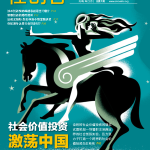 Launch of Sinovator – February 2015
Launch of Sinovator – February 2015
Sinovator, the Chinese edition of SSIR, publishes its first issue in China, taking its award-winning content global. Published at that Stanford Center on Philanthropy and Civil Society, SSIR bridges academic theory and practice with ideas about achieving social change.
Conference: China Forward – Building the Capacity of Philanthropy and Nonprofits for the 21st Century (March 18-19, 2015)
This two-day conference focused on building the capacity of philanthropy and nonprofits for the 21st century in China. Topics of discussion ranged from 21st century trends in Chinese philanthropy to how Chinese NGOs and social entrepreneurs approach strategy and capacity.
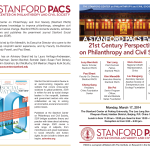 Conference: 21st Century Perspectives on Philanthropy and Civil Society (March 17, 2014)
Conference: 21st Century Perspectives on Philanthropy and Civil Society (March 17, 2014)
This day-long conference offered a unique opportunity for exchange between US-based and Asia-based scholars and practitioners to discuss topics in philanthropy and civil society including emerging data practices in the social sector, the spread of strategic philanthropy, and historical trends in comparative civil society.
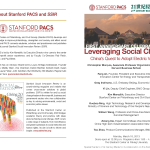 Conference: Leveraging Social Change: China’s Quest to Adopt Electric Vehicles (March 18, 2013)
Conference: Leveraging Social Change: China’s Quest to Adopt Electric Vehicles (March 18, 2013)
This program focused around the topicof electric vehicles in China. The audience included representatives from the automobile industry, NGOs community, academia, and government. Using the example of electric vehicles as a point of departure the conversation stimulated forward-looking conversations about environmental issues.
“Leveraging Social Change…” began with brief remarks from the Stanford PACS’ Executive Director, Kim Meredith. Christopher Marquis, Associate Professor Organizational Behavior at Harvard Business School, presented to the group on China’s efforts to adopt electric vehicles – a topic he explores in depth in the article “China’s Quest to Adopt Electric Vehicles,” published in the Stanford Social Innovation Review. Following his presentation, Dr. Marquis engaged in a discussion with Feng An, President and Executive Director, Innovation Center for Energy and Transportation; Zincong Xie, Vice Director, China High-tech Industrialization Association New Energy; Tao Zhao, BMW China Product Communications; and Guobao Ning, High Technology Research and Development Center, Ministry of Science and Technology of the People’s Republic of China.
The Promise of Philanthropy in China (March 20, 2013)
The Promise of Philanthropy in China welcomed an audience of Chinese and U.S. scholars, leaders, and practitioners for a day-long event, reception, and dinner. Attendees and speakers spent the day gaining new knowledge from leading-edge scholars and practitioners about key trends and issues in the field of philanthropy, and also had the opportunity to interact informally throughout the day. Participants included:
- Johanna Mair, Academic Editor, Stanford Social Innovation Review and Stanford PACS Distinguished Fellow
- Christian Seelos, Stanford PACS Research Fellow, Stanford Center on Philanthropy and Civil Society
- Woody Powell, Faculty Co-Director, Stanford Center on Philanthropy and Civil Society
- Jar-Der Luo, Profressor of Sociology, Tsinghua University, and Chairman, Chinese Network for Social Network Studies
- Susan Liautaud, Visiting Scholar, Stanford Center on Philanthropy and Civil Society
- Cheng Gang, President, China Foundation Center, and Tao Ze, Vice President, China Foundation Center
- Wayne Silby, CEO, Calvert Foundation
- Joy Cheng, Torch of Love Foundation
- Crystal Ding, LGT Venture Philanthropy
- Ian Zhu, Tsing Capital
- Elliott Donnelley, Managing Partner, White Sands Group’
Conference: 2nd China-US Strategic Philanthropy Gathering (August 31, 2012)
Stanford PACS cohosted this conference with CUSP (“China US Strategic Philanthropy Workshop”). Twenty-four participants from the US and thirty-eight from China attended this workshop. Chinese participants represented the summit of the philanthropic sector in China, including public and private foundations, research institutes, nonprofit support organizations, social investment funds, corporate CSR divisions, and the China branches of international foundations. US participants included representatives from private and family foundations, community foundations, global giving circles, social investors, nonprofit consulting companies, donor advisory groups and other experts on philanthropy.
PACS at PKU formally launched (March 21, 2012)
PACS Executive Director Kim Meredith officially opened an all-new Stanford Center on Philanthropy and Civil Society at Peking University, taking the Center’s groundbreaking work on philanthropy and civil society global.
The new center resides within the new Stanford Center at Peking University (SCPKU). Like the home office on the Stanford campus in Palo Alto, the new Stanford PACS-PKU is a research center for students, scholars and practitioners to explore and share ideas that create social change.
Stanford PACS-PKU will primarily serve Stanford faculty, visiting scholars, postdoctoral scholars, graduate and undergraduate students, and nonprofit and foundation practitioners visiting or conducting research in China. The Center will also host knowledge-sharing events and engage with the Chinese philanthropic community.
To launch Stanford PACS-PKU in Beijing, PACS hosted a series of signature events, including a grand opening presentation on “Historical and Emerging Perspectives on Philanthropy in China” with Steven C. Rockefeller III and Dr. Meng Zhao. Click here to download a PDF of the opening presentation from this event.
Stanford PACS-PKU also hosted a dinner honoring prominent Chinese venture philanthropist Joy Cheng, Founder and President of the Torch of Love Foundation (download a PDF event program).
Kim Meredith spoke on Building Corporate Trust through Philanthropy at the American Chamber of Commerce – China on March 19,2012. Click here to download a PDF of her presentation.

